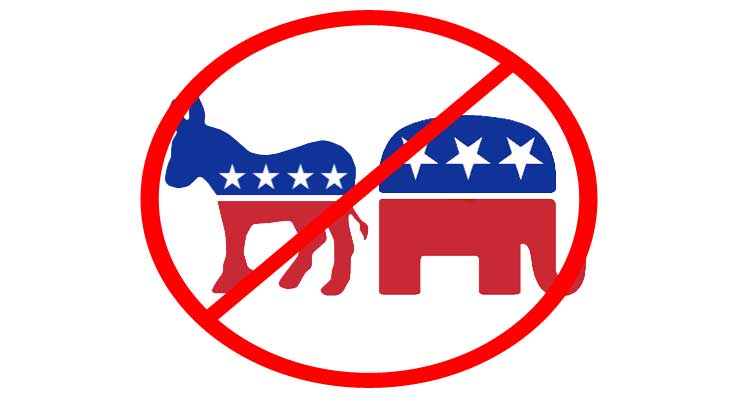“In the US, we have needed an independent political party for a very long time- an anti-racist, feminist, workers party.”
— Angela Davis
M y political affiliation is listed as independent. I’ve registered as an independent since I was old enough to vote in the general election in 2000. When I filled out the registration card on my college campus my first inclination was to bubble in democrat because I was always told that black people are supposed to vote democrat. I knew I wasn’t going to vote for George Bush and more than likely I wasn’t going to vote for Ralph Nader. I threw my lot in with Al Gore. I was bitterly disappointed as I watched George Bush become president of the United States. “This is how democracy works? Fuck the Electoral College works? Gore won the popular vote so shouldn’t he be president?”
I cannot think of a scenario where I will find myself voting for a Republican. I’m a far left leaning liberal. I believe in racial, income, gender and marriage equality. Most of the issues I’m passionate about don’t align with the platform views of most Republicans. Conversely, Democrats are far too acquiescing when it comes to defending their beliefs on the local, state and national level in both the executive and legislative branches.
I can’t fully support any organization or entity that cannot stand behind their beliefs but bargain away their principles in order to reach some sort of concession that moves further and further towards the philosophies of the other side. In my heart of hearts I wish there were a viable third or fourth or fifth party that had a realistic chance of winning elections.
I cannot think of a scenario where I will find myself voting for a Republican.
Two-party systems are flawed. You can’t accurately represent the hopes, dreams, ideals and visions of the electorate with only two choices. Before the 12th Amendment was ratified the candidate who received the most votes in the general election would become President and runner-up would become Vice President. In the United States presidential election of 1788–89, which was the first election under the new constitution, there were eight different candidates (seven Federalists and one Non-Federalist). These candidates ranged from governors (John Hancock) to Commander-In-Chief of the Continental Army (George Washington) to the former minister to Great Britain (John Adams). Sixteen states were given the opportunity to choose from eight candidates to choose for president. Imagine if we were given this type of choice today? What if potential nominees were forced to consider the needs and wants of their constituents instead of relying on simply beating their opposition and getting re-elected.
On November 8, 2016 when I perform my civic duty I’ll more than likely be given the choice between voting for Donald Trump and Hillary Clinton as President of the United States. I’m definitely not voting for Donald Trump because he’s problematic at best and Beelzebub here on Earth at worst. While I agree with Hillary Clinton on many policy issues, I’m not sure that she is the best candidate to represent me. I don’t feel strongly towards casting my ballot for her. This feeling is eerily similar to the one I had sixteen years when I was torn between voting for someone I absolutely detested on the GOP ticket and a Democrat is was unsure about. I can only hope and pray the results are not the same.
